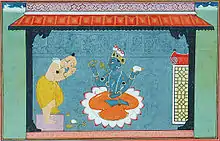Gopalanand Swami
Gopalanand Swami (1781–1852) was a paramhansa of the Swaminarayan Sampradaya who was ordained by Swaminarayan. He worked and guided many followers to spread the Swaminarayan Sampradaya. The Swaminarayan Sampradaya believes that Gopalanand Swami is regarded as one of the yogis who attained the positions of Ashthangyog or the 8 fold paths in the field of sacred yog. It is also believed that Gopalanand Swami was appointed as the head of both Vadtal and Ahemdabad Desh.
Gopalanand Swami | |
|---|---|
 | |
| Personal | |
| Born | Khushal Bhatt 8 July 1837 |
| Died | 21 April 1908 (aged 70) Vadtal, British India (present-day Gujarat, India) |
| Religion | Hinduism |
| Religious career | |
| Guru | Lord Swaminarayan[1] |
Disciples
| |
| Literary works | Gopalanand Swamini Vato |
| Part of a series on |
| Vaishnavism |
|---|
 |
|
|
| Part of a series on | |
| Hindu philosophy | |
|---|---|
 | |
| Orthodox | |
|
|
|
| Heterodox | |
|
|
|
Biography
Born as Khushal Bhatt, he was born in the Arvalli District's, Todala Village of Idar, Sabarkantha, Gujarat. His father was an audichiya brahmin, Motiram Bhatt and his mother was Kushalbaa Thakar. Gopalanand Swami pursued deep study and showed great interest of grammar, Indian philosophy of Nyaya and Vedanta. Gopalanand Swami was a scholar, with knowledge in Vyakaran (grammar), Nyaya, Mimasa, astrology. He was married to Adityabai and had two children Harisankar and Anupamba though he felt no attachment.[2] Lord Swaminarayan gave diksha (the becoming of a saint in which vows such as celibacy and renunciation of all personal possessions and of all worldly duties, including family ties are taken) to Gopalanand Swami in Vadodara, Gujarat. Lord Swaminarayan held Gopalanand Swami in very high regard and he was very learned in Ashtang yoga. Gopalanand Swami Returned to Akshardham in 1852 at place Vadtal.[3]
Responsibility of the Swaminarayan Sampradaya
When Swaminarayan returned to his abode (1 June 1830), he left responsibility of the Swaminarayan Sampradaya and the Acharyas in his hands and he looked after the satsang after the death of Swaminarayan.[4]
Sarangpur temple
Gopalanand Swami arranged for an idol of Kastabhanjan Dev Hanuman to be installed in the Sarangpur temple which is said to have come alive and moved when installed by him.[5]
Works
Sanskrit Books
- Vivekdeep
- Vishnuyaag Paddhati
- Pujavidhi
- Bhakti Siddhi
- Haribhakta Namavali
- Brahmasutrarthdeep
- Ishadi Upanishad Bhashya
- Shreemad Bhagwad Geeta Bhashya
- Commentary on Second Canto of Shreemad Bhagwat (Sukabhipray Bodhini Tika)
- Dasham Skandh Goodharth Bodhini Tika
- Ekadash Skandh Krushnabhipray Bodhini Tika
- Ved Stuti Shrutyarth Bodhini Tika and Anvayarth Bodhini Tika
- Shandilya Sutra Bhakti Prakashika Tika etc.
Vernacular Books
- Varta Vivek
- Advait Khandan
- Marathi Translation of Shikshapatri
- Updeshi Vartao
- Puja Paddhati na Pana
- Bhaktisiddhi Bhashantar (Translation of Bhaktisiddhi)
- Sampraday Pradeep
Notes
References
- Williams, Raymond (2001), Introduction to Swaminarayan Hinduism, Cambridge University Press, ISBN 978-0-52165-422-7

